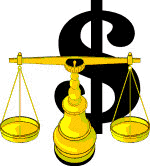 |
LEGAL
ASPECTS OF VACCINATIONS:
WAIVERS AND COMPENSATION
The decision whether or not to vaccinate is an important
one. No matter where you stand on the issue, there are undeniably risks
involved on both  sides:
on one side is the risk of your child contracting a disease if you decide
not to vaccinate; on the other side is the risk of injury or death if you
do vaccinate. The crux of the matter is of course the likelihood of such
a tragedy, which is subject to debate. What cannot be debated is that your
right as a parent not to vaccinate your child if you so choose is not widely
known, and exercising such rights is not encouraged. Furthermore, the remedies
available to those whose children have suffered injury or death from vaccines
are limited by law, are expensive and time-consuming to obtain, and are
generally unknown to the public. It is the mission of GVAL to publicize
this potentially tragic situation and to work for reform. Only when people
know their rights can they make an informed choice - this is a fundamental
tenet of a free society. Therefore, it is essential to those concerned
about the vaccination decision to know what the law provides. sides:
on one side is the risk of your child contracting a disease if you decide
not to vaccinate; on the other side is the risk of injury or death if you
do vaccinate. The crux of the matter is of course the likelihood of such
a tragedy, which is subject to debate. What cannot be debated is that your
right as a parent not to vaccinate your child if you so choose is not widely
known, and exercising such rights is not encouraged. Furthermore, the remedies
available to those whose children have suffered injury or death from vaccines
are limited by law, are expensive and time-consuming to obtain, and are
generally unknown to the public. It is the mission of GVAL to publicize
this potentially tragic situation and to work for reform. Only when people
know their rights can they make an informed choice - this is a fundamental
tenet of a free society. Therefore, it is essential to those concerned
about the vaccination decision to know what the law provides.
A majority of states have enacted into law some kind of exemption from
mandatory childhood vaccinations, based either upon personal or religious
belief or for medical reasons. In California, state law provides for mandatory
vaccinations for diphtheria, hepatitis, influenza, measles, mumps, pertussis,
poliomyelitis, rubella and tetanus, and any other diseases designated by
the Department of Health Services in consultation with the Center for Disease
Control and the American Academy of Pediatrics. This requirement is waived
if the person "files with the governing authority a letter or affidavit
stating that the immunization is contrary to his or her beliefs."
If the exemption is exercised, the student may be temporarily excluded
from school if "there is good cause to believe that the person has
been exposed" to one of the enumerated diseases "until the local
health officer is satisfied that the person is no longer at risk of developing
the disease." (California Health and Safety Code Section 120365).
This is the "personal beliefs" exemption in California law.
The exemption is fairly easy to exercise. Each student in California is
required to submit a "California School Immunization Record"
to be admitted to school (California Health and Safety Code Section 12-375).
On the reverse of the form is the following statement: "I hereby request
exemption of the child, named in the front, from the immunization requirements
for school/child care center entry because these immunizations are contrary
to my beliefs. I understand that in case of an outbreak of any of these
diseases, the child may be temporarily excluded from school for his/her
protection." To exercise the exemption, you simply sign the immunization
record under this statement.
There is another exemption which is available, although it is more difficult
to exercise because a medical opinion is necessary. If immunization is
"contraindicated", that is, considered to be potentially harmful
to the child for medical reasons, an exemption is granted upon the filing
with of "a written statement by a licensed physician to the effect
that the physical condition of the child is such, or medical circumstances
relating to the child are such, that immunization is not considered safe,
indicating the specific nature and probable duration of the medical condition
or circumstances that contraindicate immunization..." (California
Health and Safety Code Section 120370).
As anyone who has attempted to exercise their rights under these provisions
can testify, the school authorities generally take a dim view of deciding
against vaccination, especially on the grounds of personal belief. It does
not take a rocket scientist to understand why. A student who claims the
exemption makes the job of the authorities more difficult; from the prospective
of these authorities, a 100% vaccination rate would certainly be administratively
more convenient and would make it easier to perform their duties.
These difficulties could increase if the right to the exemption became
widely known or exercised. Therefore it is not in the interest of the school
health officials to promote the exercise of the waiver, and they may in
fact discourage the exercise or even conceal the existence of this legal
right. The fact that the law does not require parents to be notified of
the right to the exemption or for the school to certify that these rights
have been explained to the parent places the burden of exercising the exemption
on the individual. If you do not know of this right, the school or the
state is certainly not going to make you aware of it. It therefore falls
upon private foundations and organizations such as GVAL to make these rights
known.
While the difficulties with exercising the waiver may be the result of
mere bureaucratic indifference, more substantial obstacles are presented
when you seek legal redress in the form of compensation for injury or death
due to a vaccine. It is not as simple as filing a lawsuit against those
alleged to be responsible. This was possible before October 1988, the effective
date of federal legislation creating the National Vaccine Injury Compensation
Program (the "Program"). Since the creation of the Program, you
cannot file such a lawsuit until you file a claim under the Program and
that claim is adjudicated by the US Court of Federal Claims, the court
given jurisdiction over the Program.
The Program is a "no-fault" system of claims adjudication similar
to workers compensation, meant to provide a means of providing speedy compensation
to victims while protecting vaccine manufacturers and health providers
from excessive liability and litigation costs. Prior to creation of the
Program, several vaccine manufacturers were making overt plans to withdraw
from production because of the rising costs of litigation. There was also
a concern that the continuing litigation and public outcry over the possible
harmful effects of mandated vaccinations would undermine public confidence
in vaccines in general. The Program is the result of a compromise - streamlining
the process for obtaining compensation and limiting damage awards in the
interest of restoring public confidence in the policy of mandatory vaccinations.
Another purpose of the Program was to induce vaccine manufacturers not
to withdraw from production of vaccines.
This "compromise" requires the victims to be shunted away like
a crazy aunt hidden in the attic, so that the public support for mandatory
vaccinations is not undermined by a full public airing of the true costs
in human lives. For the individuals involved, the costs are indeed high.
While it could be argued that a small number of injuries or even deaths
are worth the risks considering the epidemics which might be prevented,
try explaining that to a mother whose child gave the ultimate sacrifice
"for the good of the cause."
Whatever the policy reasons for establishing the Program, it is an imperfect
vehicle for streamlining the process and limiting the litigation costs
of victims. Claims are to be adjudicated within a year. However, unlike
with workers compensation, social security and other similar programs,
filing a claim without legal representation is risky because of the complexity
of the process. Attorneys fees and costs may eventually be recovered through
the Program but must be advanced by the claimant unless your legal counsel
agrees to advance such sums on your behalf. Sole jurisdiction for adjudicating
claims is vested in the US Court of Federal Claims, a court which sits
only in Washington, DC. Even finding an attorney to handle a claim can
be difficult, as an attorney must be specially admitted to practice before
the Court of Claims, and the Program is virtually unknown to most attorneys.
The salient fact is that federal law prohibits filing a civil suit until
this claims process is completed, and such a suit is necessary if you elect
not to accept the award.
Contrast this cumbersome process with the relative ease of filing a workers
compensation or social security claim, or filing a bankruptcy case. Claims
offices and courts are local and accessible, information concerning these
programs is readily available, and qualified counsel is relatively easy
to find. The difficulty of prosecuting a claim through the Program or a
subsequent civil suit indicates that the "compromise" which gave
rise to the Program is disadvantageous to victims. The strong government
policy in favor of protecting public confidence in mandatory vaccines has
been accorded such great weight that the rights of individuals suffer for
the "common good". Every American, no matter how you feel about
vaccination issue, should be disturbed by this state of affairs.
. . . Larry Harris
"Are Vaccines Really Mandatory?"
Tapes Available
Larry Harris, who wrote the above article, is an attorney
who donates immeasurable time and energy to GVAL. He recently taped a cable
show which was viewed in the Long Beach, California area. The program was
an overwhelming success and we began getting numerous telephone calls.
We have produced copies of the tapes which are avaiable to our members.
If you would like a copy, please give us a call.
Send
Mail to GVAL
|
 . . |

